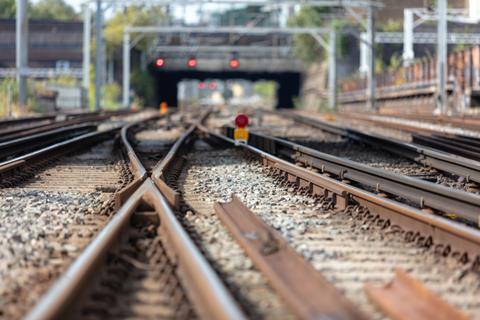Agreement with Network Rail and telecoms firms signals move towards public private funding models for infrastructure upgrades
The Department for Transport has signed a public-private partnership with Network Rail and telecoms firms to remove mobile blackspots on busy rail routes.
Signed today, the deal will see telecoms company Neos Networks install 1,000km of ultra-fast fibre optic cable along the East Coast Main Line, parts of the West Coast Main Line and the Great Western Main Line.
The department said it wants to expand the scheme, named Project Reach, beyond 5,000 kilometres in the “near future”.

Another telecoms firm, Freshwave, will also tackle signal blackspots in 57 tunnels, covering almost 50 kilometres, including the 4-kilometre-long Chipping Sodbury tunnel near Bristol.
>> See also: The infrastructure strategy opens the door to private finance
Meanwhile, mobile network operators will invest in new 4G and 5G infrastructure at 12 major Network Rail stations including Birmingham New Street, Bristol Temple Meads, Edinburgh Waverley, Euston, Glasgow Central, King’s Cross, Leeds, Liverpool Lime Street, Liverpool Street, Manchester Piccadilly, Paddington and Waterloo.
The government’s use of a public private partnership (PPP) follows last week’s publication of its 10-year infrastructure strategy, which opened the door to the funding approach where “appropriate risk-transfer can be achieved, and value for money for taxpayers can be secured”.
Other uses of PPPs confirmed by the government include private financing for Euston’s HS2 station
However, the government also said it would only pursue PPPS “where there is a revenue stream”, appearing to rule out projects where the income to pay back any private finance comes from the taxpayer, such as PFI-style structures.
The government said the Project Reach scheme will save the taxpayer £300m. It is set to start its first installations next year and will be fully rolled out by 2028.
Network Rail chief financial officer Jeremy Westlake said the project’s investment model will “deliver the necessary upgrades to our telecoms infrastructure faster whilst offering significant value-for-money for the taxpayer and stimulating wider economic benefits across the country”.
Transport secretary Heidi Alexander added: “This is a game changer for passengers up and down the country and will revolutionise journeys from Paddington to Penzance and Edinburgh to Euston.
“By boosting connectivity and tackling signal blackspots, we are also ensuring a more reliable and efficient service.”























No comments yet